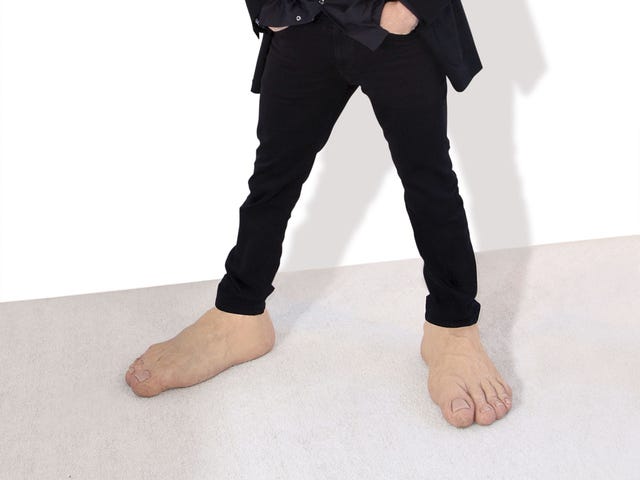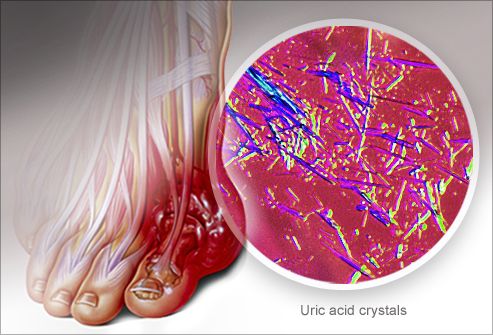The Joint Affliction of Royalty
"Not for one second did I ever think I had gout because I knew it was for people double my age."
"This year in particular has been quite frustrating. I've had gout three or four times, and I don't really know what from. So for the last four or five weeks I've actually cut out most dairy [from his diet]."
"I think young people just don't really understand or appreciate what we're putting into our bodies."
Harry Tyndall, 28, London, England
 |
|
|
"What's not easy to describe is the pain gout inflicts. I remember my
first attack as if it were just fifteen minutes ago rather than fifteen
years. It was 3:00 a.m. I awoke, to
paraphrase the first sentence of Thomas Pynchon's Gravity's Rainbow,
to a screaming coming across my sky. The big toe on my right foot was
cherry-red and as swollen as a clown's nose. It felt as if someone had
taken a flat nail and driven it, like a Vulcan, through the toe's
midpoint. If a small puff of wind blew over this toe or a sheet so much
as grazed it, it was as if a gang of droogs had commandeered Hannibal's
elephants and had them each step on that nail, one at a time. I woke
small children and large pets with my howls. I whimpered like a baby."
Dwight Garner, 50, New York
Finding himself unable to walk one morning getting out of bed, he somehow made his way to a physiotherapist where the clinician informed him he had gout. And Harry Tyndall began learning a lot about a severe form of inflammatory arthritis -- causing limbs to swell -- called gout. Of course he knew vaguely something about gout; the infamous Henry VIII whose many wives and his disposal of them leading to his schism with the Catholic Church refusing to annul his marriages, famously suffered from gout.
But this was a man whom history records as a glutton in his mid-age, a man who is known to have over-indulged in meats, pasties, alcohol. And so it made perfectly good sense medically to someone with no medical training that old Hank would come down with the excruciating pain of recurring gout. When Harry Tyndall contemplated his future, he shrank in dismay at the very thought that long distance walks might be a thing of the past for him, a young man who thought he took good care of himself through a discriminating diet and who was recreationally action-oriented.
Rare steaks and alcohol did not, in fact, form part of his normal diet. He was a health-conscious millennial, just like most of his generation who choose to abstain from both. Yet it is among this very group that gout is being seen to rise. And it is linked with sugar consumption and fatty foods making them vulnerable to gout -- and when it presents it is not something that can be tolerated and overlooked as an inconvenience; those arthritic attacks are beyond painful.
Between the years 1997 and 2012, a 64 percent rise in gout diagnoses has taken place. Now, one in 40 people are believed to suffer from the condition and although most gout patients are above sixty years of age, a growing number of 20s and 30s are complaining of symptoms consonant with gout, a 30 percent increase since 2012. Gout is triggered by a build-up of uric acid in the blood, which then progresses to become crystallized in bone joints, usually affecting the big toe which becomes enormously swollen.
 According to Dr. Alan Silman, medical director of of Arthritis Research UK, fizzy drinks and genetics play a large role in the onset of this condition; additionally, one in ten patients end to inherit the condition from their parents. Despite which, experts fail to agree on how influential genetics is in gout onset, and how much is attributable to lifestyle. Dr. Silman describes a gout attack as "probably the most painful form of severe arthritis there is". His patients recount to him their difficulty in even sleeping under a bedsheet, pressing against their toe.
According to Dr. Alan Silman, medical director of of Arthritis Research UK, fizzy drinks and genetics play a large role in the onset of this condition; additionally, one in ten patients end to inherit the condition from their parents. Despite which, experts fail to agree on how influential genetics is in gout onset, and how much is attributable to lifestyle. Dr. Silman describes a gout attack as "probably the most painful form of severe arthritis there is". His patients recount to him their difficulty in even sleeping under a bedsheet, pressing against their toe.
For Harry Tyndall both big toes in both his feet ended up swelling enormously, causing him at various points to be "on his hands and knees" in living agony. Yet what impresses him most is his forced change in entirely converting his diet. It's been two and a half years since he last had red meat or red wine. He did end up with his craving for sweet and fat compelling him to melt ice cream and drink it by the tub-full. But he's under treatment and his condition is now improving. He got married last year and was able to walk up the church aisle.
"The prevalence of gout in the U.S. has risen over the last twenty years
and now affects 8.3 million (4%) Americans. Gout is more common in men
than in women and more prevalent in African-American men than white men.
The chances of having gout rises with age, with a peak age of 75. In
women, gout attacks usually occur after menopause. Among the U.S.
population, about 21% have elevated blood uric acid levels, a condition
known as hyperuricemia. However, only a small portion of those with
hyperuricemia will actually develop gout. If your parents have gout,
then you have a 20% chance of developing it."
"Maintaining adequate fluid intake helps prevent acute gout attacks and
decreases the risk of kidney stone formation in people with gout.
Alcohol is known to have diuretic effects that can contribute to
dehydration and precipitate acute gout attacks. Alcohol can also affect
uric acid metabolism and cause hyperuricemia. It causes gout by slowing
down the excretion of uric acid from the kidneys as well as by causing
dehydration, which precipitates the crystals in the joints."
"Dietary
changes can help reduce uric acid levels in the blood. Since purine
chemicals are converted by the body into uric acid, purine-rich foods
should be avoided. Foods rich in purines include shellfish and organ
meats, such as liver, brains, and kidneys. Researchers have reported
that meat or seafood consumption increases the risk of gout attacks,
while dairy consumption seemed to reduce this risk. Weight reduction can
be helpful in lowering the risk of recurrent attacks of gout."
"Certain
medications reduce the pain and inflammation of gout attacks, such as
anti-inflammatory drugs (ibuprofen and naproxen), colchicine, and
corticosteroids. Other medications decrease the level of uric acid in
the blood and prevent the deposit of uric acid in joints (gouty
arthritis), the kidneys (stones), and in tissue (tophi), helping to
prevent further attacks and complications. These drugs include
allopurinol, febuxostat, lesinurad, and probenicid."
Web MD
 |
| WebMD |
Labels: Diet, Gout, Health, Lifestyle, Weight




0 Comments:
Post a Comment
<< Home